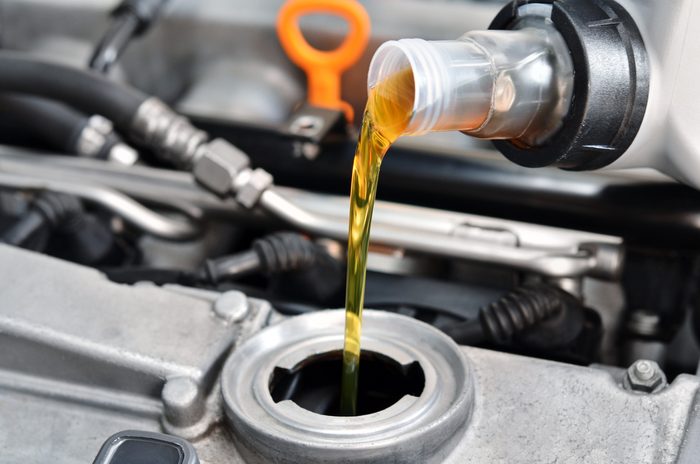How Much Is an Oil Change?

One of the best things you can do for you car is change the oil regularly. Whether you do it yourself or take it to a shop, here's what it costs.
Auto repair is dirty work that never fails to drive me to cussing, so I decided long ago to trust the pros. I still like to do two things myself, though: Replace the brake pads and change the oil.
Check that: I did like to change the oil until I bought my current vehicle, which is built too low to the ground for me to access the drain plug. Subaru, what were you thinking?
Was it worth my time to get my hands full of oil? As it turns out, not so much. By DIY-ing the job, I saved on labor costs though there isn’t much labor involved — certainly not as much as changing the brake pads.
These days, I take my car to the dealer for its regular oil change. It costs about $140, higher than it would be at a drive-in oil change shop. But the price includes a tire rotation and a multipoint inspection oil change specialists don’t offer.
Nothing is better for your car’s engine than changing the oil at manufacturer-recommended intervals. To me, getting it done at a service center is a bargain whether it includes extras or not.
On This Page
How Much Is an Oil Change?
It varies.
According to CarTalk’s 2023 survey of national service centers, two chains — Jiffy Lube and Pep Boys — offer oil changes beginning at $20. But they also offer additional services like coolant exchange, cabin air filter replacement and underbody lubrication. Although it isn’t expressly stated, chances are you’ll only get the baseline oil change price as part of a package that includes one or more of these services.
According to Kelley Blue Book, across the country, a change with conventional oil can range from $35 and $75. For synthetic oil, it’s between $65 and $125. These prices include a new oil filter.
What Factors Affect the Cost of an Oil Change?
An oil change is so easy and takes so little time you often don’t have to get out of the car.
After you park over a well, a service attendant opens the hood and the oil cap, drains the oil into a holding tank and removes the filter. Then the attendant replaces the plug, screws on a new filter, pours in new oil, replaces the oil cap and closes the hood. Boom, you’re on your way.
At least six factors determine the cost for this simple service:
- Your location: Costs vary regionally. It tends to be higher in places where the cost of living is higher, like urban California.
- Amount of oil needed: Some small engines need only 3-1/2-quarts, while engines for trucks or high-performance vehicles may need six or eight.
- Type of oil: Synthetic oil is required for some models. It’s more expensive than conventional oil, but lasts longer.
- Oil viscosity: There’s a small but noticeable price difference between low-viscosity 10W-30 and high-viscosity 20W-50 oil. Some high-mileage vehicles need higher viscosity oil.
- Brand of oil: Some, like Pennzoil, are premium products. Others, like Valvoline, are less expensive. Choosing a premium brand may extend the time between oil changes.
- Dealership vs. lube shop: It’s almost always cheaper to get your oil changed at a lube shop than at the dealer..
How Can You Save Money on Oil Changes?
Can you save money by doing your own oil change? Yes. You’ll save on labor, but it’s your call whether it’s enough to make crawling under the car worth it.
Kelley Blue Book puts the average cost of conventional oil at about $30 per vehicle, so you can save from $5 to $40 by DIY-ing your oil change. Synthetic oil costs more, about $45. But labor costs are also higher for a synthetic oil change, so you can save more — from $20 to $80.
If DIY isn’t for you, you can save money by shopping around for the best service deal. If offered a choice of brands, choose the least expensive one.
You could also save by lengthening the period between oil changes. Although this sounds bad for your car, it probably isn’t. The oil change interval has typically been 3,000 to 5,000 miles, but modern engines using synthetic oil can go 7,500+ miles between changes.



